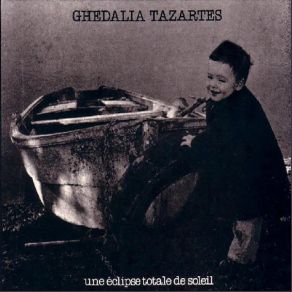Une Éclipse Totale De Soleil / Une Eclipse Totale De Soleil
Download links and information about Une Éclipse Totale De Soleil / Une Eclipse Totale De Soleil by Ghédalia Tazartès / Ghedalia Tazartes. This album was released in 1979 and it belongs to Electronica, Avant Garde Jazz, Avant Garde Metal, Alternative genres. It contains 3 tracks with total duration of 57:09 minutes.

|
|
|---|---|
| Artist: | Ghédalia Tazartès / Ghedalia Tazartes |
| Release date: | 1979 |
| Genre: | Electronica, Avant Garde Jazz, Avant Garde Metal, Alternative |
| Tracks: | 3 |
| Duration: | 57:09 |
| Buy it NOW at: | |
| Buy on iTunes $7.99 | |
Tracks
[Edit]| No. | Title | Length |
|---|---|---|
| 1. | Une Éclipse Totale De Soleil (Part I) [Part I] | 16:35 |
| 2. | Une Éclipse Totale De Soleil (Part II) [Part II] | 16:57 |
| 3. | Il Regalo Della Befana (Part III) [Part III] | 23:37 |
Details
[Edit]This was Ghedalia Tazartes' third album, originally released in 1979 and reissued on CD with a more recently recorded third part added on. His strange collages do not fit comfortably with any classification of music, but are rather in a universe of their own, in the same way that material by Harry Partch and Jean Dubuffet seem to defy any previous influences. All of his albums are extremely eccentric, but this one is even more so as the most fully realized take on the peculiar Tazartes sound. The three long pieces are actually made up of shorter sections that segue into one another. "Part One" begins with some crunching rhythms and a low droning sound, then there's a canary warbling over some strange rumbling textures and then a baby singing. The group vocal chanting that follows is even stranger, completely outside any existing music boundaries, and the composition continues through one bizarre soundscape after another. The shifts are often quite abrupt, though there's a skewed logic that ties the piece together. There's more energy and craziness in "Part Two," using similar elements of deep drones, weird vocalizing, and other peculiar sounds, textures, and rhythms, and even more loops of babies, to create unworldly bizarre chants. Recorded 17 years later, the third part, titled "Il Regalo Della Befana," remains fairly faithful to Tazartes' visionary style, even as it gets far more dramatic, with a slight symphonic operatic edge to it, as well as sections of rock & roll mutated into his twisted patchwork. Tazartes is one of those true mavericks, whose music comes out of a vacuum, a complete creation with its own rules and logic, and utterly unlike anything else.